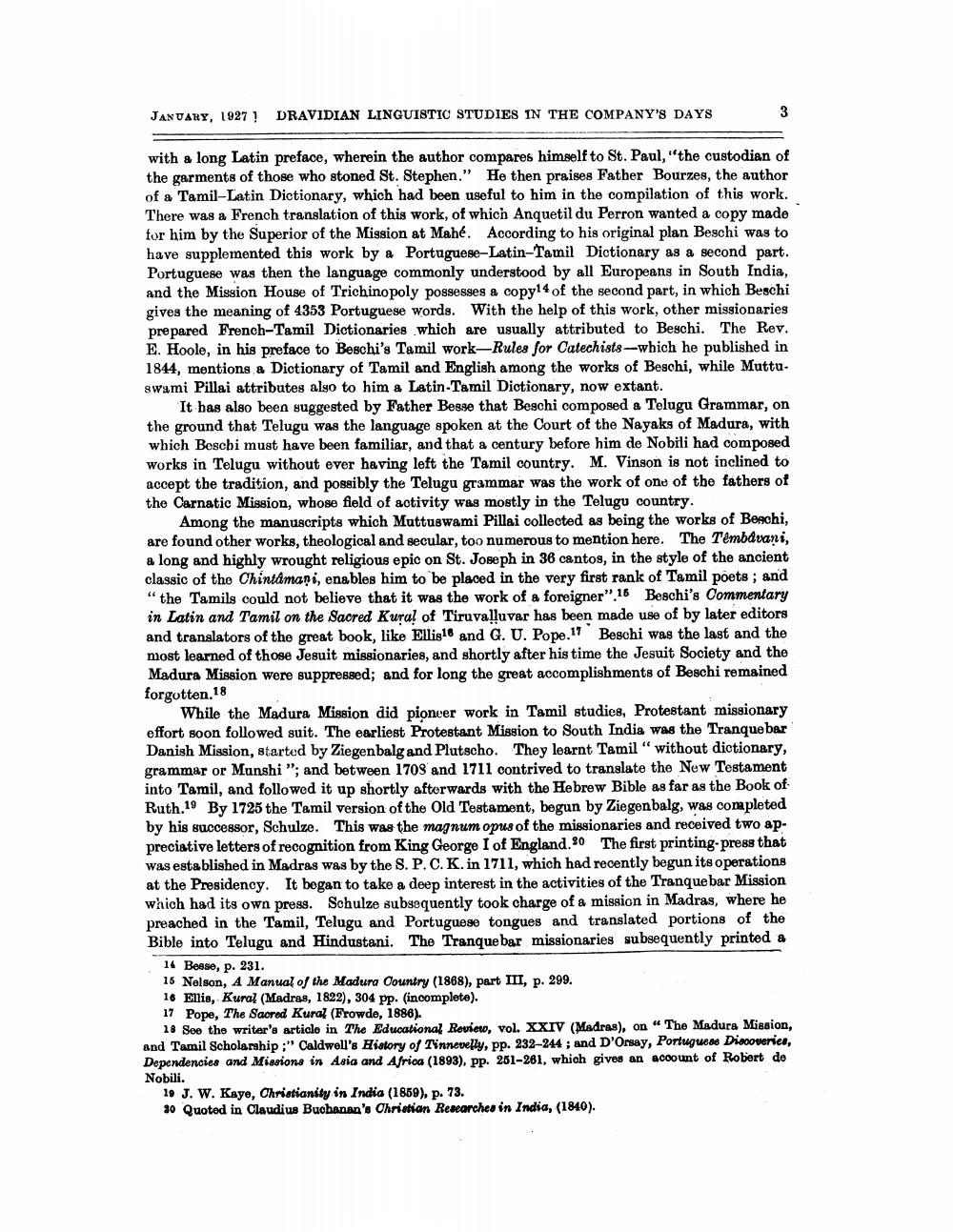________________
JANUARY, 1927) DRAVIDIAN LINGUISTIC STUDIES IN THE COMPANY'S DAYS
3
with a long Latin preface, wherein the author compares himself to St. Paul, "the custodian of the garments of those who stoned St. Stephen." He then praises Father Bourzes, the author of a Tamil-Latin Dictionary, which had been useful to him in the compilation of this work. There was a French translation of this work, of which Anquetil du Perron wanted a copy made for him by the Superior of the Mission at Mahé. According to his original plan Beschi was to have supplemented this work by a Portuguese-Latin-Tamil Dictionary as a second part. Portuguese was then the language commonly understood by all Europeans in South India, and the Mission House of Trichinopoly possesses a copy14 of the second part, in which Beschi gives the meaning of 4353 Portuguese words. With the help of this work, other missionaries prepared French-Tamil Dictionaries which are usually attributed to Beschi. The Rev. E. Hoole, in his preface to Beschi's Tamil work-Rules for Catechists --which he published in 1844, mentions a Dictionary of Tamil and English among the works of Beschi, while Muttu. swami Pillai attributes also to him a Latin-Tamil Dictionary, now extant.
It has also been suggested by Father Besse that Beschi composed a Telugu Grammar, on the ground that Telugu was the language spoken at the Court of the Nayaks of Madura, with which Beschi must have been familiar, and that a century before him de Nobili had composed works in Telugu without ever having left the Tamil country. M. Vinson is not inclined to accept the tradition, and possibly the Telugu grammar was the work of one of the fathers of the Carnatic Mission, whose field of activity was mostly in the Telugu country.
Among the manuscripts which Muttuswami Pillai collected as being the works of Beachi, are found other works, theological and secular, too numerous to mention here. The Têmbdvani, a long and highly wrought religious epic on St. Joseph in 36 cantos, in the style of the ancient classic of the Chintamani, enables him to be placed in the very first rank of Tamil poets; and "the Tamils could not believe that it was the work of a foreigner".16 Beschi's Commentary in Latin and Tamil on the Sacred Kural of Tiruvalluvar has been made use of by later editors and translators of the great book, like Ellis16 and G. U. Pope.17 Beschi was the last and the most learned of those Jesuit missionaries, and shortly after his time the Jesuit Society and the Madura Mission were suppressed; and for long the great accomplishments of Beschi remained forgotten.18
While the Madura Mission did pioneer work in Tamil studies, Protestant missionary offort soon followed suit. The earliest Protestant Mission to South India was the Tranquebar Danish Mission, started by Ziegenbalg and Plutscho. They learnt Tamil" without dictionary, grammar or Munshi "; and between 1709 and 1711 contrived to translate the New Testament into Tamil, and followed it up shortly afterwards with the Hebrew Bible as far as the Book of Ruth.19 By 1725 the Tamil version of the Old Testament, begun by Ziegenbalg, was completed by his successor, Schulze. This was the magnum opus of the missionaries and received two appreciative letters of recognition from King George 1 of England.20 The first printing press that was established in Madras was by the S.P.C.K. in 1711, which had recently begun its operations at the Presidency. It began to take a deep interest in the activities of the Tranquebar Mission which had its own press. Schulze subsequently took charge of a mission in Madras, where he preached in the Tamil, Telugu and Portuguese tongues and translated portions of the Bible into Telugu and Hindustani. The Tranquebar missionaries subsequently printed a
14 Besse, p. 231. 16 Nolson, A Manual of the Madura Country (1868), part III, p. 299. 16 Ellis, Kural (Madras, 1822), 304 pp. (incomplete). 17 Pope, The Sacred Kural (Frowde, 1886).
18 Soe the writer's article in The Educational Review, vol. XXIV (Madras), on “ The Madura Mission, and Tamil Scholarship ;" Caldwell's History of Tinnevelly, pp. 232-244 ; and D'Orsay, Portuguese Discoveries, Dependencies and Missions in Asia and Africa (1893). pp. 251-281, which gives an account of Robert de Nobili.
19 J. W. Kaye, Christianity in India (1859), p. 73. 30 Quoted in Claudius Buchanan's Christian Researches in India, (1840).




